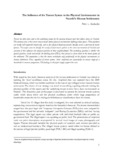| dc.contributor.author | Makachia, Peter | |
| dc.date.accessioned | 2013-06-12T07:15:37Z | |
| dc.date.available | 2013-06-12T07:15:37Z | |
| dc.date.issued | 2011-09-01 | |
| dc.identifier.citation | Institut Français de Recherche en Afrique (IFRA) Les cahiers d'Afrique de l'est 44 (2011) 77-102 | en |
| dc.identifier.uri | http://halshs.archives-ouvertes.fr/halshs-00751862 | |
| dc.identifier.uri | http://erepository.uonbi.ac.ke:8080/xmlui/handle/123456789/31968 | |
| dc.description.abstract | Tenure has often been cited as the underlying reason for the wanting physical state that defines slums in Nairobi. The contrary view is that secure tenure would bestow physical environments befitting urban spaces. These positions are hardly well-supported empirically, and in fact physical depravity persists broadly across a spectrum of tenure options. This paper aims to identify the variety of land tenure systems in the slum environments of Nairobi and ascertain if this influences the physical qualities of these neighbourhoods. The underlying question is whether the spatial qualities, inside and outside the dwelling units (DUs), that prevail in slums relate to the tenure system of the settlement. The proposition is that the tenure contributes only peripherally to the physical environments in human settlements. Thus, regardless of tenure system, 'slum' conditions are unavoidable at various stages of a householder's economic progression. The findings in the paper largely support this view. | en |
| dc.language.iso | en | en |
| dc.publisher | Univesity of Nairobi | en |
| dc.title | The Influence of the Tenure System to the Physical Environments in Nairobi's Human Settlements | en |
| dc.type | Article | en |
| local.publisher | School of Urban And Regional Planning | en |

